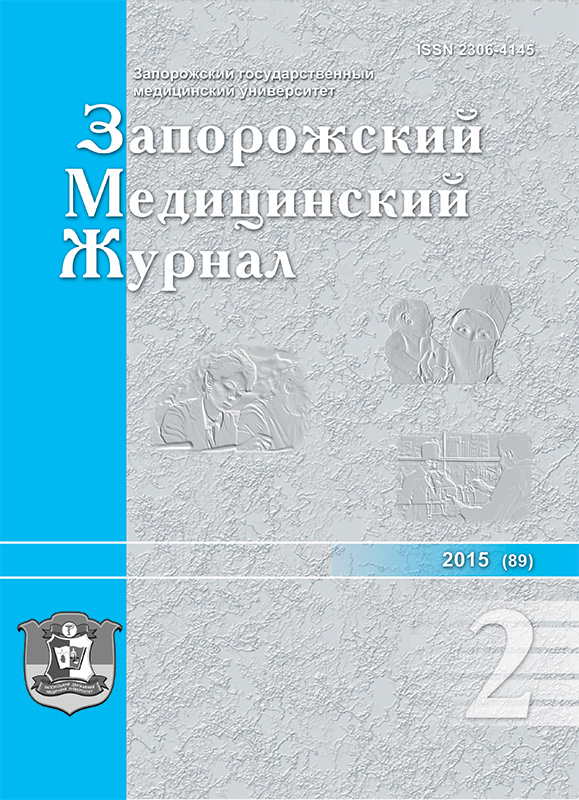Evaluation of some laboratory parameters in patients with chronic generalized periodontitis associated with persistent herpesvirus infection
DOI:
https://doi.org/10.14739/2310-1210.2015.2.42120Keywords:
Periodontal Diseases, Herpesviridae Infections, Laboratory Techniques and ProseduresAbstract
Introduction. The nature of local pathogenetic mechanisms of periodontal tissue lesions is the result of the interaction of various etiopathogenetical determinants. The researchers almost do not consider influence of persistent herpes virus infection on the state of immunobiological organism resistance and deterioration of the overall prognosis of dental disease.
Aim. To identify the features of laboratory parameters in 45 patients with periodontal pathology associated with herpes virus infection.
Material and methods. Laboratory study of 45 people with periodontal pathology associated with herpes virus infection (group I), 20 individuals with periodontal pathology without concomitant herpes infection (group II) and 10 individuals without periodontal pathology and without concomitant herpes viral infections (control group), namely: determining the amount of gingival fluid according to M. Barer et al. and determining therein the content of inflammatory mediators – histamine and serotonin according to B. Mykhailychenko, adsorption reaction of microorganisms was studied according to M. Danilevsky and T. Bilenchuk.
Results. Amount of gingival fluid in persons of I and II groups had significant difference (p<0,05) between both among them and in comparison with the control group. The content of histamine and serotonin in the gingival fluid of individuals of I and II groups had significant difference (p<0,05) between them, it was also significantly (p<0,01) higher than the corresponding figures for patients of the control group. Indices of RAM-positive cells in patients of groups I and II were significantly lower (p<0,05) than in the control group. In addition, indices of group I were significantly lower (p <0,05) than in group II.
Conclusions. Persistent herpes infection significantly affects the state of immunobiological organism resistance and worsens the overall prognosis of periodontal tissue pathology.
References
Volosovets, T. M. (2011) Rol asotsiatsii virusno-bakterialnykh mikroorhanizmiv u vynyknenni ta rozvytku zapalnykh ta dystrofichno-zapalnykh zakhvoriuvan tkanyn parodontu, asotsiiovanykh z persystuiuchoiu virusnoiu infektsiieiu [The role of associations viral-bacterial microorganisms in the origin and development of inflammatory and dystrophic-inflammatory periodontal tissue diseases associated with persistent viral infection]. Infektsiini khvoroby, 2(64), 94–99. [in Ukrainian].
Pavlenko, O. V., Volosovets, T. M., & Yunakova, N. M. (2011) Patohenetychne likuvannia zapalnykh ta dystrofichno-zapalnykh zakhvoriuvan tkanyn parodontu, asotsiiovanykh z persystuiuchoiu virusnoiu infektsiieiu [Pathogenetic treatment of inflammatory and dystrophic-inflammatory periodontal tissue diseases associated with persistent viral infection]. Kyiv [in Ukrainian].
Volosovets, T. M., Yunakova, N. M., & Silchenko, V. P. (2012) Osoblyvosti mistsevoi imunnoi vidpovidi v osib iz zapalnymy ta destruktyvno-zapalnymy zakhvoriuvanniamy tkanyn periodontu, asotsiiovanymy z persystuiuchoiu herpesvirusnoiu infektsiieiu [Features of local immune response in patients with inflammatory and degenerative and inflammatory diseases of periodontal tissues, associated with persistent herpes virus infection]. Sovremennaya stomatologiya, 2, 11–14. [in Ukrainian].
Downloads
How to Cite
Issue
Section
License
Authors who publish with this journal agree to the following terms:
Authors retain copyright and grant the journal right of first publication with the work simultaneously licensed under a Creative Commons Attribution License that allows others to share the work with an acknowledgement of the work's authorship and initial publication in this journal. 
Authors are able to enter into separate, additional contractual arrangements for the non-exclusive distribution of the journal's published version of the work (e.g., post it to an institutional repository or publish it in a book), with an acknowledgement of its initial publication in this journal.
Authors are permitted and encouraged to post their work online (e.g., in institutional repositories or on their website) prior to and during the submission process, as it can lead to productive exchanges, as well as earlier and greater citation of published work (See The Effect of Open Access)

